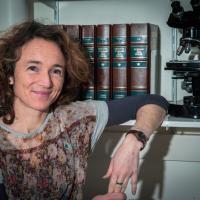
Food, Global Health Reading time 2 min
Rut Carballido-López, winner of a 2017 ERC Consolidator Grant
Published on 16 December 2017
Rut Carballido-López is a microbiologist and research director in charge of the ProCeD team (Prokaryotic Cell Development) of the Joint Research Unit (INRA-AgroParisTech) for Food and Gut Microbiology for Human Health (MICALIS). Passionate about science and biology, her work is dedicated to understanding the mechanisms that determine the shape of bacteria. Her research has helped bring to light the actin cytoskeleton of bacteria and its role in synthesizing the bacterial wall, which is a key factor in determining the shape of cells, and their first line of defence against the environment. The discovery is opening up new fronts in the fight against bacterial pathogens, in a context where resistance to antibiotics has become a major public health issue. In addition to its structural role, the bacterial wall provides a protective barrier for bacteria and is therefore a preferred target for antibiotics. Better understanding the construction the bacterial wall opens up new possibilities for finding new modes of action for antibiotics.
This is not the first time the European Research Council has shown faith in Carballido-López. Indeed, the Consolidator Grant, which provides 1.9 million euros over five years, comes after an ERC Starting Grant, awarded to the researcher in 2012. This second award will finance the BActin project, which is designed to take previous research with a cellular and genetic outlook a step further, with new multi-disciplinary approaches, and in particular by studying the biochemistry and biophysics of the components that make up the bacterial cytoskeleton. The work will also help determine modes of action of antibiotics that inhibit the synthesis of the bacterial wall. The research, designed to cover all scales from molecular to cellular, uses cutting-edge technology in microscopy and spectroscopy, but also depends on modelling the growth of bacterial cells in order to predict their behaviour when they come up against an obstacle like antibiotics.
Thanks to this European grant, Rut Carballido-López will strengthen her team by bringing in new talent. Three post-doctoral posts will be opened from January 2019, for a biochemist, a specialist in bacterial cell walls, and an expert in super-resolution imaging. One doctoral candidate, an engineer and a technician will also be recruited.
- 2017 ERC Consolidator Grant
- 2015 Prix Irène Joliot-Curie de la jeune femme scientifique, Académie des Sciences (Paris, Nov. 2015)
- 2012 ERC Starting Grant
- 2011 EMBO Young Investigator (EMBO-YIP)
- 2003 Amersham & Science Prize for Young Scientists. Europe finalist (New York, Oct. 2003)
- 2003 Nat L. Sternberg Thesis Prize (Madison, USA, Aug. 2003)
- 2002 Promega Young Life Scientist of the Year (York, UK, March 2002).
- 2001 Young Microbiologist of the Year. Society of General Microbiology (SGM), UK
